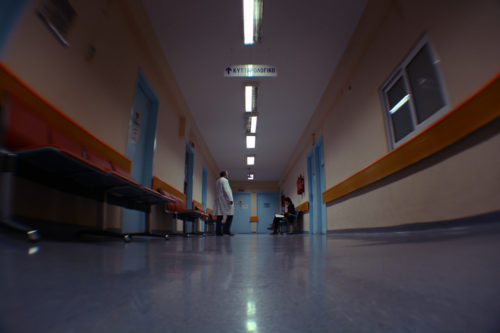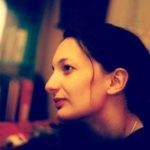
Chris Acos photo
By
Mileva Anastasiadou
It was two months ago when my father died of natural causes. That’s what the doctors claimed.
“Natural causes? What may that mean?” I asked. Don’t get me wrong, I know people die. But they die of something. They can’t just die naturally. Something must have been wrong.
“Cardiac arrest,” they explained. That means that his heart suddenly stopped. I kept thinking he willingly stopped his heart. Doctors said it was old age, yet I couldn’t get the thought out of my mind: my father ordering his heart to stop. Was that an alternative to suicide?
He had been working at the Shop & Save store for more than forty years. Rumors say he must have invented the store’s name. Until one day, he got fired. Shop & Save. My father could neither shop, nor save during his last days. His monthly pension was barely enough and his savings quickly ran out. I don’t think it was lack of money that led him to despair, though. I think it was lack of faith. My father had lost his faith. Not in God, but in a certain way of living.
When the crisis started, some years ago, most of us were concerned, but didn’t worry too much. We were not afraid of the Great Depression. We thought we’d get away. We were supposed to be the smart ones and these things only happen to dumb people. Or lazy people. We were determined to work hard to survive. To continue to shop and save like we used to. And we did. And we kept pretending the problem was happening elsewhere. In another neighborhood. In another town, or perhaps in another country. Yet the domino effect hit us when our turn came. And we fell down, like beaten tiles, wondering what on earth had happened.
On the day I buried my father, the bank auctioned off my house. That’s the day the Great Depression hit me. It was lurking behind the tall trees of the cemetery and rushed over me the moment I answered that call from the bank. I can’t recall much from that day. I remember I shouted for a long time, speaking incomprehensibly, until the ambulance came. As soon as the paramedics performed the injection, all went quiet.
I woke up in the hospital. I stayed there for long, sedated most of the time. I swallowed the pills day after day, without presenting any objections. The pills were my last hope after all. Some of the time I felt better, but once I remembered what led me to that hospital bed, emotion overwhelmed me and I cried like a child. I considered it progress. At least I didn’t shout. Doctors claimed I was an intractable case of depression.
“Like the Great Depression?” I asked.
“A bit more personal, but yes,” they answered.
I thought it was all about my intractable situation. Doctors claimed I should stand up on my feet again. I thought I had no chance. You can’t expect doctors to understand. I wouldn’t have understood either a few years ago. However empathetic you might be, you still cannot understand someone, unless you can truly walk in their shoes.
“Don’t expect much of them,” Anna told me, the first time she approached. “They’re just gears in the machine.”
“What machine?” I asked, not taking my eyes off the void I was staring into, ahead of me. Fixing my eyes anywhere else than right ahead required too much effort, probably due to the sedatives I was treated with. I wasn’t willing to try that hard.
Anna came and stood right in front of me so that I could look at her.
“Drugs won’t help. You need action, action is the only true antidote to despair.”
“Isn’t love supposed to be the antidote?” I asked jokingly, yet Anna took my question rather seriously and answered back:
“Don’t be silly. That’s only fairy tales for children. Action is the only solution to your problems.”
“I have no will to act. I have acted long enough and look where it got me.”
“You’re sillier than I thought,” she said knocking on my head, as if she tried to wake me up, or perhaps checking if there was something more than emptiness in there. “You’re not to blame for all that. They decided to change things a bit. To make you poor. To play with you. You are nothing but a token in their game.”
“Who are they?”
Anna bowed and whispered in my ear: “I’m not sure. But the doctors are definitely a part of the game.”
Anna had lost her job. Her husband left her two months before she was hospitalized. Her only child lived abroad. She was all alone and desperate too. She decided to see herself as a victim of a social experiment. She called it the game of the fastest adaptation.
There’s an earthquake. In only lasts a few seconds. Once it stops, you feel safe. But are you really? Buildings might collapse on you. Huge waves might follow. They might swallow you, or they might not. Your own little world might seem unchanged. Yet it’s not.
“The smaller the impact, the better the response,” I said.
“The more time you have, the better you adapt,” she claimed.
An abrupt fall may destroy you. Falling slowly might not be so bad. In fact, it may be life-saving. You might even get used to falling. You adjust like all organisms adapt to slow worsening conditions, yet they cannot endure sudden changes. Slow bleeding may leave you tired, yet a sudden hemorrhage might kill you. A tumor might grow in your brain, leaving you fully functional for long, yet a fast growing mass might prove fatal. It’s all a matter of time.
People adapt. Yet sudden changes deprive them of the necessary time to adjust. You might be raised poor, or get poor slowly. But a suddenly inflicted poverty will immobilize you, before you have the time for adjustment. I wondered what suddenly meant. How long does suddenly last?
“They try to push you to your limits. To see how far you will go before you fall apart, measuring the exact amount of pain, which will prove sufficient to kill you.”
Her words made sense at the time. They still do sometimes. Yet they didn’t comfort me at all. My mind was nothing but a bunch of neurons interconnecting to form a failed response to experience. When night came, I went to the pharmacist and asked for a pain killer. When he turned around I grabbed a bunch of medicines that were on the table in front of him, careful enough to not take all of them and attract his attention. I went to my room and swallowed them all of them at once. Action might work for Anna. It didn’t seem like a good enough solution for me.
“This token surrenders, Anna,” I thought to myself and lied on the bed waiting for the end.
The most extraordinary thing happened then. I felt lighter by the minute and all of a sudden I was as light as a feather, as if I had beaten gravity once and for all and I started rising above, not getting up but rising as if I could fly. I looked behind and saw my body lying on the bed asleep, not following me in the flight towards the roof. And just about the time I was ready to cross the roof and fly out of the building, I heard screams and turned around once more and saw Anna over my body, pressing my chest with all her strength.
“I won’t let them take you,” she shouted and kept pressing my chest up and down and then doctors ran in the ward and took her away, only to continue what she had been doing.
I cannot be certain as to whether I had a choice or not, yet I began feeling heavier and I slowly went back and became one with my body again, just before I took a deep breath and opened my eyes. I hadn’t smiled for a long time and I almost felt my lips hurt when I smiled back at the doctor who saved me. I didn’t feel hopeless anymore in the knowledge that something different awaited me when my time would come. I had never been spiritual before, yet this experience proved that I was more than just a body. There was also a soul in me, that could be tortured in this life but when released, it would be free to fly high in the sky or maybe higher, to a place like heaven.
I obediently took my medicines every single day, as I used to. I am not sure if it was the meds or my faith responsible for my recovery.
I was homeless when I left the hospital but didn’t care. I heard Anna committed suicide a few days after my failed attempt. I felt reassured that she was in a better place, somewhere faraway from the game she had imagined. Faith was the antidote to despair, after all.
“When the brain lacks oxygen, hallucinations evolving from irritation of certain brain areas may form which cause the patient to experience the so-called out of body experience, by disconnecting the body from the sense of its position in place. They may be considered a coping mechanism of a conscious mind to deal with death, but basically that is just an assumption. Some people have managed to evoke the hallucinations consciously, or to trigger them with drugs, believing them to be spiritual experiences, named astral projection or other imaginative names.”
The little radio player I held fell off my hands and onto the ground. I soon followed, having lost all faith that had kept me straight up, in an instant. A bunch of incompetent neurons, holding onto a false belief to survive. A bunch of neurons crushed by reality. The amount of pain that kills differs from person to person, yet all people break at a certain point. We are not made flexible enough to be invincible. In desperate times, we tend to cling to anything that might relieve the pain: drugs, faith, action, love. Some coping mechanisms are better than others, yet in the end, all efforts might prove fruitless, if change is too abrupt. Perhaps Anna had been right all along. Perhaps I proved too weak to endure the social experiment she kept talking about. She wasn’t strong enough either. Action must be a satisfying solution, come to think of it. I felt beaten, as if a boot was stepping on me, as if I was a bug on the ground waiting to be crushed. I could have resisted, had I been prepared. Probably, I would have been crushed either way, yet gaining back the lost sense of control would have kept me sane. I kept lying still though, at the corner of the road, invisible to the passer-byes who could still shop and save, waiting for the moment when the hallucinations would start to make my journey easier.
Mileva Anastasiadou
Mileva Anastasiadou is a neurologist, living and working in Athens, Greece. Her work can be found or is forthcoming in many journals and anthologies, such as the Molotov Cocktail, Foliate Oak, Maudlin house, Menacing Hedge, Midnight Circus, Big Echo: Critical SF, Jellyfish Review, Asymmetry Fiction, Cold Creek Review and others. She has published two books in Greek and a collection of short stories in English (Once Upon a Dystopia by Cosmic Teapot Publication).


No Comments Yet!
You can be first to comment this post!